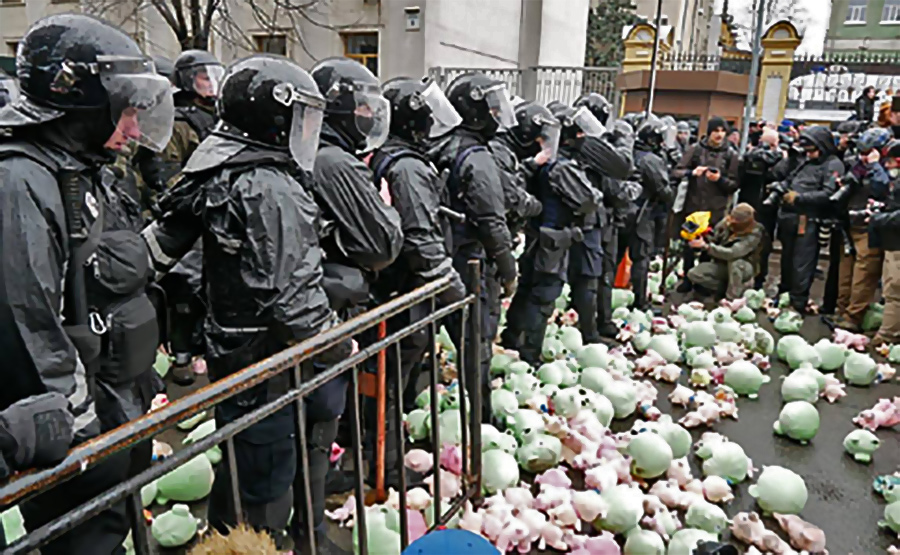ACT I - LOOKING BACK: ELECTION CAMPAIGNS AND POWER DUALISM
Avakov's political options
During the presidential campaign [of 2019], Avakov and Poroshenko pursued conflicting interests. A victory for Poroshenko would have ended Avakov's career. His political home, the People's Front (Narodnyi Front), had done surprisingly well in the first parliamentary elections after the Maidan in autumn 2014, finishing with over 22%. Their seats in the Verkhovna Rada kept together an ever-thinning coalition with the Petro Poroshenko Bloc, thereby ensuring Avakov's political survival. Poroshenko would have been happy to see him removed, but had no way to get a majority for that, only the breakdown of the coalition at a bad moment would have been certain.
In the most recent elections, the “frontoviki” had little prospect of re-entering the Rada with their poll ratings ranging below 1%. Had Poroshenko been able to secure a second term, he would have had no reason whatsoever to hold on to Avakov any longer.
After the parliamentary elections had been brought forward to the summer, the People's Front yielded to the facts, declaring that it would not take part and just intended to nominate individual candidates. Avakov could not work with the Servants of the People due to their "new faces" recruiting policy.
So that’s what he did – just not according to the actual intention of that deal.
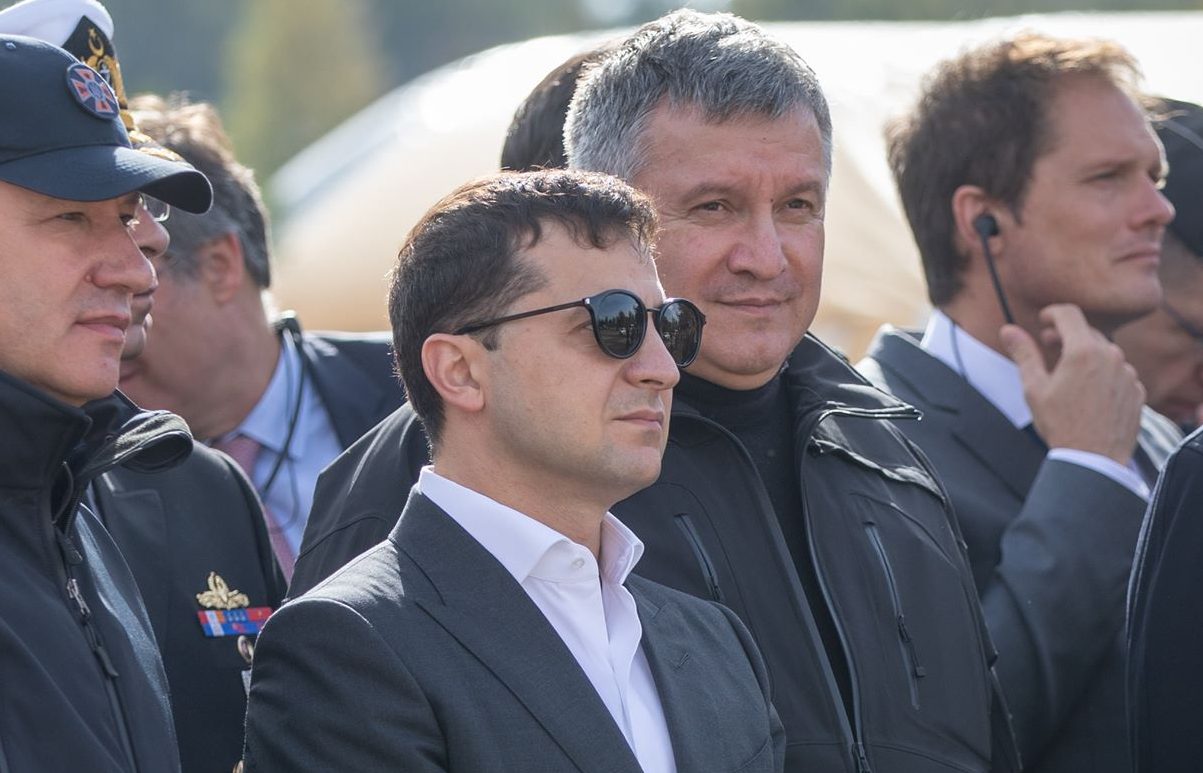
A Conflict of Power Blocks
Avakov used the elections as a test run for his loyalty and demonstrated his usefulness by drawing on two of his most crucial powers: control over those who are supposed to guarantee the President’s security – and influence over those who might endanger it.
On the surface, he staged himself as a neutral authority between the candidates and their campaign ruses and cleverly exploited the authority of the National Guard and the police to ensure a fair and democratic election process. A total of 133,000 forces were deployed. During the election, Avakov’s blog saw a rising number of postings in which he praised the success of the smoothly running elections.
However, he was not impartial.
Yuliya Tymoshenko, on the other hand, was the preferred target of allegations and revelations by the SBU and Lutsenko, at that time Prosecutor General. Why was that?
The conflict between Poroshenko and Avakov intensified during the campaign. The two were leading competing power blocks within the executive organs.
This dualism has its roots in the immediate phase after the Euromaidan revolution when Avakov became Minister of the Interior and the interim government had to face Russia's increasingly open intervention in Crimea and the southern and eastern regions. On top of that, it also had to deal with the implosion and discrediting of the corrupt security forces still loyal to Yanukovych and with a run-down, dysfunctional army.
In this situation, Avakov decided to (re)establish a National Guard answering to the Ministry of the Interior and consisting of volunteers – “just like the Maidan, but with military means," as Avakov later wrote.

The National Guard units participated in regular combat operations. During the summer of 2014, when, instigated by Russia, the war gradually developed into a conventional interstate conflict, the National Guard battalions were given heavy military technology only to be demilitarised again in early 2015 after the Minsk II agreement. Since then, they have been used primarily to protect critical infrastructure and to maintain law and order during protests.
The first parliamentary elections after the Maidan cemented the dualism. In the coalition negotiations, party leader Yatseniuk insisted on appointing Avakov as Minister of the Interior – as a counterweight to Poroshenko. While the president is commander-in-chief of the army and can appoint the head of the Ukrainian Secret Service SBU and the Prosecutor General, Avakov commands the National Guard with 60,000 and the National Police with 140,000 men.
Avakov-style Election Campaign
As a result, control over the security authorities was also used in the election campaign.
A joint public declaration by the executive organs in the run-up to the elections remained lip service.
It is a good thing to uncover election manipulations – which were perpetrated by all candidates with the appropriate means, especially by Poroshenko with his administrative resources. However, the selective use of the security apparatus and the exploitation of known cases of manipulation as "kompromat" is problematic.
Instructive in this regard are the events that unfolded at the beginning of 2019.
On February 21, police officers in the northeastern Sumy region arrested two members of Poroshenko's campaign team suspected of buying votes on a large scale. The arrest was a reaction to a recent nationwide search conducted by the Secret Service among the staff of the Tymoshenko campaign, which the SBU justified, among other things, with evidence pointing to a large-scale election fraud pyramid.
The same night that the suspects were released, the SBU and prosecutors retaliated by executing search warrants at the police officers involved in the arrest. Avakov did not wait long before reacting: almost simultaneously he went public with a story about a massive system for organized vote-buying allegedly set up by Poroshenko.
It is not very plausible that election pyramids set up by the two largest opponents are uncovered at the same time. These disclosures should be seen as reactive, deliberately timed retaliatory acts with the intent of distracting from accusations against the own camp and discrediting the political opponent.
Test Run for Loyalty
In March 2019, Poroshenko's campaign appearances in several cities led to partly violent protests by the radical right-wing National Corps and the National Militia ("Druzhyny") (a kind of civil defense militia), who both belong to the Azov movement.
In Cherkasy, the protests were spontaneous and chaotic, clashes occurred between militia members and hurriedly gathered local police units. A few days later, in Zhytomyr, the Azov supporters were already well-organized and managed to disrupt Poroshenko's appearance without police intervention.
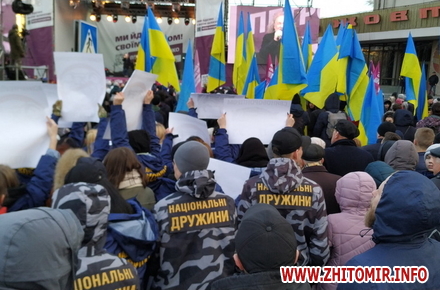
Poroshenko was furious and accused Avakov of the passivity of the law enforcement officers. Avakov refused to speak to the president – and instead went live on the evening show of broadcaster ICTV, charging the president with being responsible for a massive pyramid of ballot riggers, who supposedly could reach up to two million people.
Avakov demonstrated that he knows how to choreograph his “craft” in a similar case as well. The National Militia was officially approved as election observers. At the beginning of March 2019, Militia spokesman Ihor Vdovin announced in an interview that if the need should arise, they would also resort to violence in order to prevent election manipulations. Already at past local elections, NGOs had interpreted the martial presence of the Militia as an attempt to intimidate them. Avakov threatened the Militia with consequences, in turn, their threat with violence remained empty – and Avakov emerged as the tough guy.
The journalist Roman Romanyuk sums up the intertwining of his two means of power: “With one hand he [Avakov] attacks, with the other he intervenes.”
A Necessary Evil?

In a video message the newly elected President Zelenskyy expressed his personal thanks to Avakov, stressing that "perhaps for the first time in the country's history, the Ministry and the police had not acted in favor of a special candidate."
[highlight]Like Poroshenko before him, Zelenskyy entered in a relationship of dependence by cooperating with Avakov, which poses a latent threat.[/highlight]
However, there were no alternative nomination proposals, the appointed cabinet members were voted on as a package deal to avoid criticism of individual choices from within the parties. Ten parliamentary group members refused to approve the cabinet.
Participants at the crucial, controversial meeting of the newly elected majority faction of the "Servants of the People" party with President Zelenskyy report that Avakov was even considered for the office of Deputy Prime Minister, responsible for all executive organs. The idea was rejected, the fear of the power this would concentrate on him was too great.
At the same time, Avakov is very unpopular among the people.
At the end of August 2019, on the day it became clear that Avakov was to serve as Minister of the Interior also in the Honcharuk cabinet, several hundred protesters gathered outside the presidential office and demanded his immediate removal from office under the slogan "Avakov is the devil."
They referred to the interior minister's dubious “successes,” among others the sabotaged police reform, delayed investigation in dozens of murder cases of activists, journalists, and politicians, as well as the lack of political and judicial consequences in corruption cases concerning him or his environment.
Regardless of this, Zelenskyy held (and still holds) on to Avakov, justifying his choice with Avakov's experience as a civil servant. After the recent government reshuffle (Shmyhal), he once more described him as "one of the most effective officials.”
As a response to the criticism and a means to get Avakov in line, his reappointment was tied to a six-month probation period and linked to a number of conditions, among which a renewal of personnel, the reform and demilitarisation of the Ministry of the Interior and results in the delayed murder investigations of activists and journalists.
The set deadline has passed without him delivering - as will be shown - nevertheless, he still is in office. What makes him so irreplaceable, despite all the criticism?
Persistence through Neo-Patrimonialism

Avakov heads a number of executive organs (National Police, National Guard, Border Patrol, Anti-Drug Unit), which despite all efforts to reform operate on a neo-patrimonial logic.
Members of this system are recruited from the old guard within the police forces, part of the ATO veterans, and those left out in the process of filling top positions in the executive authorities by means of party quota.
Avakov sabotaged the police reforms initiated under Poroshenko in 2015 by tacitly reversing the lustration of corrupt officials from the Yanukovych era, who were tested for their suitability for democracy with the help of corrupt judges. The majority of the reform-oriented top officials resigned in the years to follow, despairing in the face of the persistence of the authorities.
Some of the nationalist Maidan activists formed the Azov Battalion, which was integrated into the National Guard with increased manpower in November 2014 and equipped with high-quality technology under Avakov's direction. Avakov gave a number of Azov people high positions in the security apparatus.
For example, he disavowed an important element of the police reform, namely the separation between the office of Minister of the Interior and the post of Police Chief, by appointing Vadym Troyan, a former Azov fighter, as Deputy Head of the National Police and finally Deputy Minister of the Interior. In return, Avakov as their patron benefits from the group’s organizational differentiation into a regiment, party, and vigilante groups.
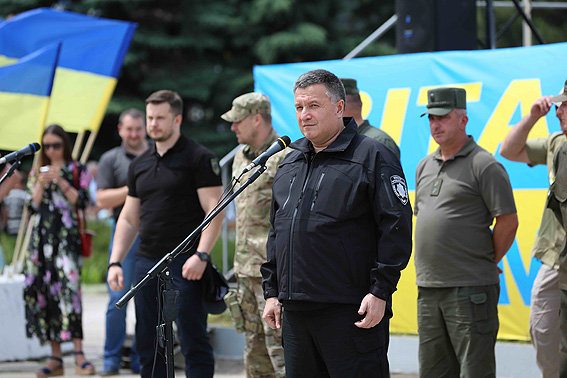
From the time of the coalition between the Petro Poroshenko Bloc and the People's Front, loyalists of the People's Front still hold positions in most executive agencies, as the key positions were then filled by party quotas. After Poroshenko lost, his people were fired. Those belonging to the Popular Front stayed for the most part.
When the new government came into power, its political fate was already in Avakov's hands.
It is the resulting persistence that makes Avakov so irreplaceable.
[highlight]Breaking the patrimonial logic or introducing a new person into the do’s and dont’s of the apparatus is virtually impossible[/highlight], at best it takes time. Time that Zelenskyy lacked, as he needed someone right then to watch his back during the street protests.
Avakov is the only one with the necessary authority and the only one with the power to oppose Zelenskyy should he try to oust him from his position.
Avakov's Goals, Opponents and Allies
This picture provides insights regarding Avakov's goals, opponents and allies. He wants:
- a) to maintain and expand the power and the responsibilities of the Ministry of the Interior and his influence on other executive authorities;
- b) to keep up the neo-patrimonial functional logic, from which he benefits, as numerous corruption scandals have shown;
- c) to prevent any judicial and political consequences for him and his entourage.
Any weakening of the reform-oriented forces plays into his hands.
This leads to situational convergence of interests with a large number of actors besides Avakov’s direct allies, actors who can be found in the parliament, the committees, the inner circle of power around the president, the executive authorities and also among the oligarchs, here especially Ihor Kolomoiskyi, who promoted Zelenskyy’s run for president and facilitated his election by giving him access to his media resources.
Against this background, the second part of this article will analyze Avakov’s political practice against the backdrop of the change of course in cadre politics.
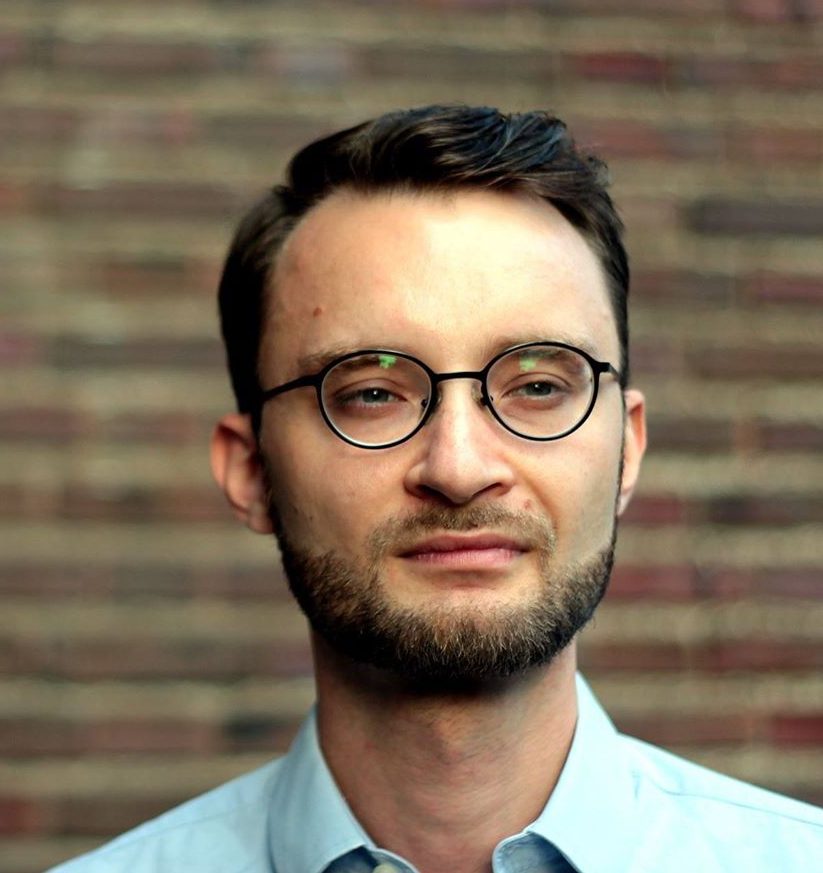
Read also:
- Minister Avakov keeps dodging political responsibility for heinous police crimes
- Ukraine’s new Cabinet: new faces, merged ministries, and the immortal Avakov
- A year after, Ukrainian activists still ask who ordered Kateryna Handziuk
- Attacks on civic activists in Ukraine reaching critical level, encouraged by unreformed police
- Epidemic of attacks on activists in Ukraine – result of aborted police reform



